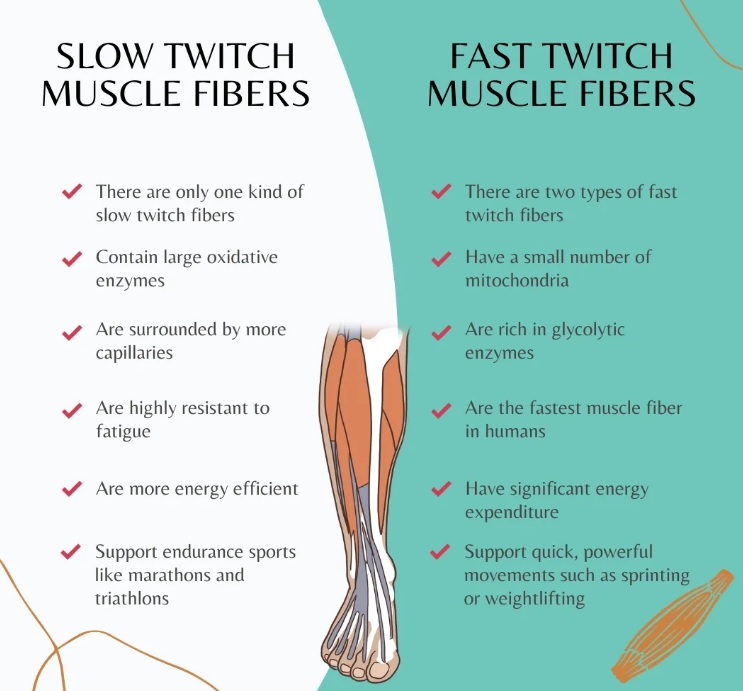Muscle fatigue is a natural and temporary decline in the ability of muscles to generate force or sustain a particular level of activity. It is a common phenomenon that occurs during physical activity, especially during exercise or prolonged muscle use. People may notice a reduced capacity to perform movements, decreased power output, and a sense of exhaustion during muscle fatigue.
It can happen for several reasons such as during exercise or intense physical activity, as the demand for energy and oxygen increases. This can lead to metabolic changes within the muscle cells.
Recognizing the different mechanisms that contribute to muscle fatigue is specifically important for athletes and fitness enthusiasts, as it can help in devising effective training strategies, recovery protocols, and injury prevention measures. Through proper training, nutrition, and recovery practices, individuals can enhance their muscular endurance and resilience, minimizing the impact of muscle fatigue on their physical activities and pursuits.

Factors That Contribute To Muscle Fatigue
Many factors can affect the muscle’s ability to generate force and sustain contractions. Here are some common causes of muscle fatigue:
- Metabolic factors: During intense exercise or prolonged muscle use, there is an increased demand for energy and oxygen. Depletion of energy substrates, such as ATP, and the accumulation of metabolic byproducts can contribute to muscle fatigue.
- Neural factors: The central nervous system plays a crucial role in muscle fatigue. Changes in motor unit recruitment, firing rate, and neural signaling efficiency can impact muscle performance. As fatigue sets in, there may be a decrease in the frequency of neural impulses to the muscles.
- Contractile factors: Within the muscle fibers themselves, there can be impairments in the contractile machinery such as a decline in the availability of calcium ions.
- Metabolic waste: Accumulation of metabolic waste products can cause oxidative stress and affect the normal function of the muscle. This can contribute to muscle fatigue and hinder the ability of the muscle to generate force.
- Electrolyte imbalances: Imbalances in these electrolytes (sodium, potassium and magnesium) can disrupt muscle contraction and contribute to muscle fatigue.
- Psychological factors: Mental fatigue, lack of motivation, and decreased focus can influence muscle fatigue and can affect a person’s ability to sustain muscle contractions.
Examining The Impact Of Neural Factors On Muscle Fatigue
Neural fatigue can happen when there is a decrease in the efficiency of the motor neurons that control muscle activation. This can result in a decline in muscle force production and a sense of reduced muscle power.
Here are a few examples of factors that contribute to neural fatigue:
- Decreased motor unit recruitment: With fatigue, fewer muscle fibers are being activated. This can lead to a reduction in overall muscle force production.
- Decreased firing rate: Motor neurons normally send electrical impulses to activate muscle fibers. With neural fatigue, the firing rate of the motor neurons becomes reduced resulting in a diminished ability to sustain muscle contractions.
- Altered motor neuron excitability: Neural fatigue can also involve changes in the excitability of motor neurons. This can affect their responsiveness to incoming signals from the CNS, leading to a reduced ability to activate muscle fibers.
- Neurotransmitter imbalances: Any form of imbalance in the neurotransmitters, which are responsible for the transmission of signals from motor neurons to muscle fibers, can impair neural signaling and contribute to neural fatigue.
Metabolic Byproducts And Their Effect On Muscle Fatigue
During intense exercise or prolonged physical activity, the body undergoes metabolic processes to generate energy. This results in the production of metabolic byproducts that can contribute to muscle fatigue.
Lactic acid is one of the primary metabolic byproducts associated with muscle fatigue. The lactic acid is generated during anaerobic metabolism when there isn’t enough oxygen supply to meet the energy demands of the muscles. In addition to lactic acid, other metabolites such as hydrogen ions (H+) and inorganic phosphate (Pi) can also accumulate during exercise. The accumulation of these metabolites can lead to a drop in muscular pH, impair muscle force production and contribute to muscle fatigue.
Also, when the energy stores (ATP and creatine phosphate) are depleted, the ability of the muscle fibers to generate force and sustain contractions diminishes. To reduce the impact, it is important to include proper nutrition to replenish energy stores, maintain hydration, and incorporate strategies to help clear metabolic waste products.
Understanding The Muscle Fibers
Two types of muscle fibers play a significant role in muscle fatigue: slow-twitch (Type I) and fast-twitch (Type II),
Slow-twitch muscle fibers (Type I) are more resistant to fatigue and are commonly found in muscle groups involved in activities such as cycling, or swimming. Slow-twitch fibers have a high capacity for utilizing oxygen and rely on fat as a fuel source. They are capable of sustaining contractions for longer durations without experiencing significant fatigue.
Fast-twitch muscle fibers (Type II) are further categorized into Type IIa and Type IIb fibers. Type IIa fibers have moderate resistance to fatigue and are involved in activities that require both endurance and strength. Type IIb fibers, also known as fast-fatigue fibers, have low fatigue resistance and are primarily involved in high-intensity, short-duration activities. They are responsible for generating powerful contractions but fatigue more quickly compared to Type I or Type IIa fibers.
Slow-twitch fibers have a higher capillary density, allowing for efficient oxygen and nutrient delivery whereas fast-twitch fibers rely more on anaerobic metabolism leading to the accumulation of metabolic byproducts.

Strategies To Improve Muscular Endurance And Delay The Onset Of Muscle Fatigue
- Proper nutrition: A well-balanced diet can provide the nutrients and energy required for the proper functioning of the muscles. This should have a good quantity of carbohydrates, protein and fats.
- Gradual progression: By gradually increasing the intensity and duration of exercise, the muscles adapt well and endurance can be built over time which can prevent the early onset of fatigue.
- Interval training: Incorporating interval training, which alternates between high-intensity bursts and periods of rest or lower intensity, can improve endurance and delay muscle fatigue.
- Strength training: Building strength through resistance training exercises helps improve muscle endurance and delays fatigue. Stronger muscles are better equipped to handle the demands of physical activity without tiring quickly.
- Proper rest and recovery: Allowing sufficient rest and recovery time between workouts is crucial for muscle repair and growth as overtraining can cause increased fatigue and decreased performance.
- Breathing techniques: Paying attention to proper breathing techniques during exercise can optimize oxygen delivery to the muscles, helping delay fatigue.
- Warm-ups: A warm-up before exercise can increase the blood flow to the muscles, enhance muscle flexibility, and prepare the body for the workout.
Muscle Fatigue In Different Sports And Activities
Muscle fatigue is a common occurrence in various sports and activities, and its specific manifestation can vary depending on the demands and characteristics of the sport. Here are some examples of how muscle fatigue can affect different sports and activities:
- Endurance sports: Endurance sports include activities such as long-distance running or cycling and mainly involve the slow-twitch muscle fibers. Muscle fatigue in endurance sports can have a gradual decline in performance resulting in decreased muscle power output as the result of glycogen depletion, electrolyte imbalances or metabolic byproduct accumulation.
- Power sports: Power-based activities includes weightlifting or sprinting and heavily engages fast-twitch muscle fibers and require high-intensity, explosive efforts. Muscle fatigue in these sports may involve rapid declines in power output, decreased muscle contractility, and a loss of explosive strength. Factors such as the accumulation of metabolic byproducts, and neuromuscular fatigue contribute to muscle fatigue in power-based sports.
- Team sports: Team sports such as soccer or basketball require a mix of endurance, power, agility, and coordination. Muscle fatigue in team sports can manifest in various ways, including reduced sprinting speed, decreased accuracy in passing or shooting, decreased jumping ability, and diminished decision-making skills. Factors like energy system demands, repeated high-intensity efforts, muscle damage, and mental fatigue contribute to muscle fatigue in team sports.
- Gymnastics: Gymnastics requires strength, flexibility, balance, and precise movements. Muscle fatigue in gymnastics can lead to decreased muscle control, reduced stability, and compromised performance in complex movements and routines. Factors such as muscle glycogen depletion, inadequate recovery between intense routines, and mental fatigue can contribute to muscle fatigue in gymnastics.
- Martial arts: Martial arts involve explosive movements and sustained endurance. Muscle fatigue in martial arts can result in decreased striking power, reduced speed and accuracy, compromised defense, and diminished reaction time. Factors like energy system demands, repetitive strikes or kicks, and mental fatigue play a role in muscle fatigue during martial arts training and competition.
Nutrition And Supplementation For Muscle Fatigue
- Macronutrient balance: For muscle function and recovery, it’s important to take an appropriate balance of carbohydrates, protein and fats. Including a mix of complex carbohydrates, lean proteins, and healthy fats in your diet can help provide the necessary fuel and nutrients for muscle recovery.
- Hydration: Proper hydration is important for maintaining muscle function, recovery and preventing fatigue. Dehydration can impair muscle performance and increase the perception of fatigue.
- Anti-inflammatory foods: As chronic inflammation can contribute to muscle fatigue and delayed recovery, including anti-inflammatory food such as berries, fatty fish and leafy greens can help reduce inflammation and support muscle health.
- Timing of meals: It is important to take either a balanced meal or snack within the post-workout window (ideally within 30 to 60 minutes). This can help replenish glycogen stores, support muscle recovery and minimize fatigue.
- Supplementation: In certain cases, specific supplements may be beneficial for addressing muscle fatigue. Supplements such as creatine monohydrate can enhance strength and power output, whereas branched-chain amino acids (BCAAs) can reduce exercise-induced muscle damage. But, always consult with a healthcare provider, who can guide you with the appropriate supplementation, as this can vary between individual’s needs.
Practical Strategies For Building Resilience Against Muscle Fatigue
- Progressive training: Gradually increase the intensity, duration, or volume of your workouts over time. This progressive approach allows your muscles to adapt and build endurance without overwhelming them.
- Adequate rest and recovery: Prioritize rest days between workouts to allow your muscles time to repair and rebuild. Incorporate active recovery techniques like light exercises, stretching, foam rolling, or massage to enhance circulation and alleviate muscle tension.
- Sleep quality: Aim for quality sleep to support muscle recovery and overall well-being. Ensure you get enough hours of sleep and create a sleep-friendly environment that promotes deep and uninterrupted sleep.
- Stretching and flexibility exercises: Regular stretching and flexibility exercises can improve muscle elasticity, reduce muscle tightness, and enhance range of motion which prevents muscle imbalances and decrease the risk of injury.
- Cross-training: Engage in a variety of exercises and activities to prevent overuse of specific muscles. Cross-training helps develop overall strength, balance, and flexibility, reducing the risk of muscle fatigue in specific muscle groups.
- Proper warm-up and cool-down: A proper warm-up exercise increases the blood flow to the muscles and prepares them for the upcoming activity. Likewise, cool down with light aerobic exercise and stretching to aid in the removal of metabolic byproducts and reduce post-workout muscle soreness.
- Recovery modalities: Explore different recovery modalities such as cold-water immersion, compression therapy, or contrast showers to reduce muscle inflammation and promote recovery.
- Monitoring training load: Pay attention to your training load and listen to your body. Avoid sudden spikes in intensity or volume that may lead to excessive fatigue. Use training apps or devices to track your workouts and monitor your progress.
- Stress management: Chronic stress can contribute to muscle fatigue and hinder the recovery process. Some of the techniques that can help with stress management include deep breathing exercises, meditation, or yoga.
Remember that building resilience against muscle fatigue takes time. So, pay attention to your body, make adjustments as needed, and find the balance between challenging yourself and allowing for proper recovery.
Common Questions About Muscle Fatigue
How long does muscle fatigue typically last?
For some people, muscle fatigue can last for a few hours while others can have it up for a couple of days depending on the intensity and duration of the physical activity.
How can I differentiate between muscle soreness and muscle fatigue?
Muscle soreness is the discomfort or pain felt in muscles 24 to 72 hours after intense exercise. It can be a dull, achy feeling or tenderness in specific muscles or muscle groups.
Does muscle fatigue lead to muscle loss or muscle gain?
Muscle fatigue itself does not directly lead to muscle loss or muscle gain. However, prolonged or excessive muscle fatigue without proper rest and recovery can contribute to muscle breakdown and potential muscle loss, while appropriate exercise-induced muscle fatigue followed by adequate rest and nutrition can promote muscle growth and gain.
How can I recover from muscle fatigue more quickly?
To recover from muscle fatigue more quickly, prioritize sufficient rest and sleep to allow your muscles to repair. Additionally, maintain a balanced diet with adequate protein intake to support muscle recovery and growth.
Are there any supplements or treatments that help with muscle fatigue?
There are no specific supplements to help with muscle fatigue. However, maintaining a balanced diet, resting well and staying hydrated can help with recovery and reduce muscle fatigue.
Can muscle fatigue be a sign of an underlying health condition?
Yes, it could be a sign of an underlying health condition, so it’s important to visit a healthcare professional and get a proper diagnosis.
When should I seek medical attention for persistent muscle fatigue?
If you are experiencing persistent muscle fatigue that is accompanied by other symptoms such as weight loss, it’s important to seek medical attention for proper evaluation.









